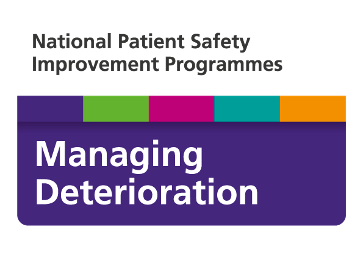Find out more
For any enquiries, please contact our HIN South London email.
Get in touch
The Managing Deterioration National Patient Safety Improvement Programme aims to reduce deterioration-associated harm through better system co-ordination and as part of safe and reliable pathways of care.
The PIER framework of Prevention, Identification, Management and Response forms a critical basis to the delivery of the programme.
key areas include:
The programme is supported by the South London Managing Deterioration Network, which aims to bring together individuals and organisations from across the patient pathway who are concerned with reducing deterioration-associated harm and is a dedicated space for improvement, sharing learning and growth.
Current projects
Paediatric Early Warning Score
The Health Innovation Network is supporting the roll out of a national paediatric early warning score (nPEWS) as part of the System-wide Paediatric Observation Tracking (SPOT) Programme. The SPOT Programme is a collaboration between NHS England and Improvement, the Royal College of Paediatrics and Child Health (RCPCH) and the Royal College of Nursing (RCN) – you can find out more about the programme here.
A small but significant number of deteriorating children experience suboptimal outcomes because of a failure to recognise and respond to acute deterioration early enough, leading to unintended harm and potentially fatal consequences. Early warning systems to aid clinical practice are widespread in paediatric settings but currently there is no single validated Paediatric Early Warning Score system.
The nPEWS charts and escalation pathway have been designed to provide a standardised process to identify, escalate and respond to deterioration in acutely unwell children. Early adopter sites have been selected to participate in paper-based and digital testing within in-patient hospital settings for the following age ranges:
The HIN is supporting Lewisham and Greenwich NHS Trust and St George’s University Hospitals NHS Foundation Trust with piloting nPEWS in south London. The HIN has also partnered with UCL Partners AHSN to form a PEWS Peer Support Group for participating early adopter sites across London to share reflections, learning and collaborate over challenges.
If you are interested in learning more about the national project, please visit the dedicated workspace on the FutureNHS Platform – System-wide Paediatric Observations Tracking (SPOT) Programme – FutureNHS Collaboration Platform.
Managing deterioration Network
About the network
The Managing Deterioration Clinical Network was launched in November 2021 and takes a system-wide approach to addressing challenges faced when managing deterioration and extends across the entire patient pathway.
Building on from previous initiatives, the Network is a supportive and collaborative space in which colleagues can learn from each other, share successes, and open channels of communication at the interface of services to tackle challenges.
Who should attend?
We welcome representatives from adult and paediatric primary, secondary and community care, London Ambulance Service and 111, urgent response teams, and care homes, to develop the network and ensure contributions from across key services in managing deterioration. We also warmly welcome patients, service users and experts by experience to bring your insights and perspectives of the system.
For information on when the next network event is being held, please visit our events page.
Early recognition and treatment of sepsis is vital in saving lives. The infection can develop rapidly, and therefore, it is important that patients, parents and caregivers, as well as medical professionals, are able to recognise its signs and symptoms.
Find out more about our sepsis work